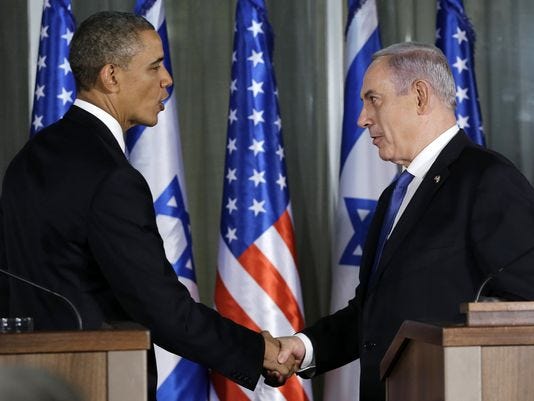 |
| President Obama and Prime Minister Netanyahu |
President Obama is finally visiting Israel for the first time during his two terms as president. Today, he met with Israeli Prime Minister, Benjamin Netanyahu and "expressed an unusual degree of solidarity" as the Washington Post described. The two leaders have never strayed from disagreeing publicly before, so it's fair to say that this gentility may be more than just show.
 |
| Aww, see? They're friends! |
President Obama has also agreed to open talks on extending the U.S.'s annual $3 billion military aid package to Israel for another 10 years. The current agreement will expire in 2017.
Additionally, the two discussed the prospect of al-Assad employing chemical weapons in Syria. While Netanyahu has already accepted this as fact, Obama is still speculative and described this revelation as a "game changer" for U.S. policy if ongoing investigations confirm the allegations. He also stated, "We have to make sure that we know exactly what happened, what was the nature of the incident, what we can document, what we can prove...I won’t make an announcement today about next steps, because I think we have to gather the facts."
In short: Obama and Netanyahu agree on Iran. What does this mean for the future of U.S. foreign policy? Also, feel free to discuss the implications of chemical warfare in Syria.
5 comments:
I find Netanyahu's change of tune concerning Iran interesting. What changed? Is it that now the threat is more imminent, gung-ho bravado seems unwise? Or do they feel pressured by the U.S. to follow the same pro-diplomacy path?
It's one thing for Israel and the US to agree on diplomacy, but getting Iran to agree with a diplomatic solution is a whole other issue. There doesn't really seem to be any major changes in the issue. The US continues to back Israel while Iran continues to make progress with its nuclear weapons program. Time is running out. If the US and Israel want a diplomatic solution, then they better act soon and get in contact with Iran if they want to stop them from becoming nuclear.
It's not surprising that Obama and Netanyahu both want to prevent volatile elements like Iran or Syria from causing further unrest in the Middle East. Both have expressed discontent with Iran before and now shouldn't be any different. As allies, the two leaders will have to work together to secure better defense against their enemies and better relations with each other. Though I'm not sure how much money Obama can lend Israel given America's economy is not yet fully recovered.
US foreign policy has worked on stabilizing the Middle East for a long time. Controversial events like the Iraq and Afghanistan Wars delivered disappointing results. Obama is wisely waiting for evidence regarding chemical weapons in Syria before making a move. He probably is well aware that becoming too aggressive due to vague evidence could trigger a war unnecessarily in the Middle East.
Chemical warfare in Syria could potentially push the US as well as its allies into providing further kinds of assistance to the Syrian rebels. Syria would also be a dangerous threat to the rest of the Middle East.
Still, it is nice to know world leaders can at least try to get along with each other. There should definitely try diplomatic solutions first before doing anything drastic. Iran might have a nuclear bomb soon, but they don't currently have one aiming at the US. For now, both nations ought to gather more information before taking military action.
I have to agree with a lot of Rachel's questions... However, I think we're going to have to wait a while to get more answers on what really happened between these two leaders during their meeting... It seems almost too good to be true that Netanyahu "changed his mind" this quickly...
My question/concern about the United States' new foreign policy agenda relates to how the U.S. will treat Palestinians from now on... It is certainly a good idea to "re-group" with one's allies and design a peaceful course of action, but surely at some point, the local Palestinian community will want to voice their opinions and struggles to the U.S. as well. The whole situation is slightly reminiscent of that girl scouts song that goes, "Make new friends, but keep the old..." I'm pretty confident that the U.S. can keep Israel as an "old friend," but I have no clue as to whether the president will openly accept Palestine in the future as well.
I am disappointed that all that has come out of the talk is Iran and Syria. I believe the crisis with the Palestinians is a much greater problem at the time. There are people that are complaining about whether or not they're going to get their own country and how Israel is going to react to it.
However, back to Iran, I feel like the US and Israel need to come to some plan in stopping a nuclear Iran. Every time a country gets nuclear weapons, it isn't just harmful to the US, but the world as a whole. We all know that in areas such as the Middle East, even if a weapon has a good purpose, it can fall into the wrong hands. Whatever, these talks amount to it needs to stop weapons from falling into the wrong hands.
Post a Comment